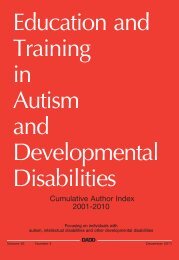Download the Journal (PDF) - Division on Autism and ...
Download the Journal (PDF) - Division on Autism and ...
Download the Journal (PDF) - Division on Autism and ...
Create successful ePaper yourself
Turn your PDF publications into a flip-book with our unique Google optimized e-Paper software.
si<strong>on</strong>s. The mean interobserver agreement rate<br />
for Eric’s performance was 95.2%. Reliability<br />
data for Devin were collected for five out of 22<br />
(22.7%) sessi<strong>on</strong>s. The mean interobserver reliability<br />
rate for Devin’s performance was<br />
95.2%. Performance reliability data for TJ<br />
were collected for four out of 18 (22%) sessi<strong>on</strong>s<br />
<strong>and</strong> revealed a mean interobserver rate<br />
of 97%. Performance reliability data for Jen<br />
were ga<str<strong>on</strong>g>the</str<strong>on</strong>g>red for four out of 22 (18%) sessi<strong>on</strong>s<br />
<strong>and</strong> mean interobserver agreement was<br />
calculated at 94%. Interobserver reliability<br />
data for Bob were collected for four out of 22<br />
(18%) sessi<strong>on</strong>s <strong>and</strong> showed a mean interobserver<br />
agreement rate of 94%.<br />
Data related to procedural reliability were<br />
also collected for approximately 20% of all<br />
sessi<strong>on</strong>s. Independent raters documented<br />
whe<str<strong>on</strong>g>the</str<strong>on</strong>g>r or not graduate students used an attenti<strong>on</strong>al<br />
cue prior to initiating a facilitating<br />
comment or questi<strong>on</strong>, perceived naturalness<br />
of c<strong>on</strong>versati<strong>on</strong>s, use of predetermined cueing<br />
levels, <strong>and</strong> use of positive reinforcement during<br />
interventi<strong>on</strong> c<strong>on</strong>diti<strong>on</strong>s. Results indicated<br />
an overall procedural reliability rating of 96%<br />
across all graduate students. This percentage<br />
indicated an acceptable level of procedural<br />
reliability.<br />
Discussi<strong>on</strong><br />
This study’s results indicate an overall functi<strong>on</strong>al<br />
relati<strong>on</strong>ship between a systematic instructi<strong>on</strong>al<br />
approach <strong>and</strong> increased socialpragmatic<br />
skills for high school students with<br />
moderate cognitive disabilities. Specifically,<br />
participants generally increased <str<strong>on</strong>g>the</str<strong>on</strong>g>ir skills related<br />
to taking obligatory turns, taking n<strong>on</strong>obligatory<br />
turns, asking partner-focused questi<strong>on</strong>s,<br />
using appropriate eye c<strong>on</strong>tact, <strong>and</strong><br />
using appropriate t<strong>on</strong>e of voice. While some<br />
performance variability was indicated, general<br />
improvement was documented in multiple areas<br />
for all participants. Individual learning<br />
<strong>and</strong> pers<strong>on</strong>ality characteristics as well as naturally<br />
occurring distracti<strong>on</strong>s in <str<strong>on</strong>g>the</str<strong>on</strong>g> generalizati<strong>on</strong><br />
setting may have c<strong>on</strong>tributed to this variability.<br />
This study also shows that high school<br />
lunchroom envir<strong>on</strong>ments may serve as naturalistic<br />
settings for facilitating <strong>and</strong> assessing<br />
students’ generalizati<strong>on</strong> of pragmatic-social<br />
language skills. Our results extend <str<strong>on</strong>g>the</str<strong>on</strong>g> find-<br />
ings of McGee <strong>and</strong> colleagues (1992) who<br />
found that peer incidental teaching resulted<br />
in gains by students with disabilities in reciprocal<br />
peer communicative interacti<strong>on</strong>s in an<br />
academic setting but that <str<strong>on</strong>g>the</str<strong>on</strong>g>se skills did not<br />
generalize to school mealtimes. Strategies for<br />
promoting pragmatic-social skills in naturalistic<br />
settings need to be fur<str<strong>on</strong>g>the</str<strong>on</strong>g>r investigated.<br />
We recommend more research investigating<br />
<str<strong>on</strong>g>the</str<strong>on</strong>g> effectiveness of various systematic instructi<strong>on</strong>al<br />
strategies <strong>on</strong> <str<strong>on</strong>g>the</str<strong>on</strong>g> social-pragmatic<br />
skills of students of varying ages <strong>and</strong> ability<br />
levels. The current study c<strong>on</strong>tributes to <str<strong>on</strong>g>the</str<strong>on</strong>g><br />
literature base that supports structured facilitati<strong>on</strong><br />
techniques that enhance communicati<strong>on</strong><br />
interacti<strong>on</strong>s <strong>and</strong> relati<strong>on</strong>ships between<br />
students with disabilities <strong>and</strong> <str<strong>on</strong>g>the</str<strong>on</strong>g>ir peers. However,<br />
we recommend enhancing <str<strong>on</strong>g>the</str<strong>on</strong>g> generalizability<br />
of <str<strong>on</strong>g>the</str<strong>on</strong>g> current study’s findings by implementing<br />
similar systematic instructi<strong>on</strong>al<br />
procedures to o<str<strong>on</strong>g>the</str<strong>on</strong>g>r populati<strong>on</strong>s <strong>and</strong> settings<br />
such as community-based <strong>and</strong> vocati<strong>on</strong>al educati<strong>on</strong>al<br />
sites. For example, extending <str<strong>on</strong>g>the</str<strong>on</strong>g><br />
findings of Ingersoll, Dvortcsak, Whalen, <strong>and</strong><br />
Sikora (2005) <strong>on</strong> <str<strong>on</strong>g>the</str<strong>on</strong>g> effectiveness of developmental<br />
social-pragmatic language interventi<strong>on</strong><br />
approaches bey<strong>on</strong>d children with autism<br />
spectrum disorders may encourage more research-based<br />
practice in sp<strong>on</strong>taneous speech<br />
<strong>and</strong> communicative interacti<strong>on</strong>s between<br />
peers with <strong>and</strong> without disabilities in naturalistic<br />
envir<strong>on</strong>ments.<br />
References<br />
358 / Educati<strong>on</strong> <strong>and</strong> Training in Developmental Disabilities-September 2008<br />
Beukelman, D. R., & Mirenda, P. (1998). Augmentative<br />
<strong>and</strong> alternative communicati<strong>on</strong>: Management of<br />
severe communicati<strong>on</strong> disorders in children <strong>and</strong> adults<br />
(2 nd ed.). Baltimore: Brookes.<br />
Brown, F., & Holvoet, J. (1982). Effect of systematic<br />
peer interacti<strong>on</strong> <strong>on</strong> <str<strong>on</strong>g>the</str<strong>on</strong>g> incidental learning of<br />
who severely h<strong>and</strong>icapped students. <str<strong>on</strong>g>Journal</str<strong>on</strong>g> of <str<strong>on</strong>g>the</str<strong>on</strong>g><br />
Associati<strong>on</strong> for <str<strong>on</strong>g>the</str<strong>on</strong>g> Severely H<strong>and</strong>icapped, 7, 19–29.<br />
Chadsey-Rusch, J. (1990). Social interacti<strong>on</strong>s of sec<strong>on</strong>dary-aged<br />
students with severe h<strong>and</strong>icaps: Implicati<strong>on</strong>s<br />
for facilitating <str<strong>on</strong>g>the</str<strong>on</strong>g> transiti<strong>on</strong> from<br />
school to work. <str<strong>on</strong>g>Journal</str<strong>on</strong>g> of <str<strong>on</strong>g>the</str<strong>on</strong>g> Associati<strong>on</strong> for Pers<strong>on</strong>s<br />
with Severe H<strong>and</strong>icaps, 15, 69–78.<br />
DeGeorge, K. L. (1998). Friendship <strong>and</strong> stories:<br />
Using children’s literature to teach friendship<br />
skills to children with learning disabilities. Interventi<strong>on</strong><br />
in School <strong>and</strong> Clinic, 33, 157–162.<br />
Downing, J. E. (1999). Teaching communicati<strong>on</strong> skills
















